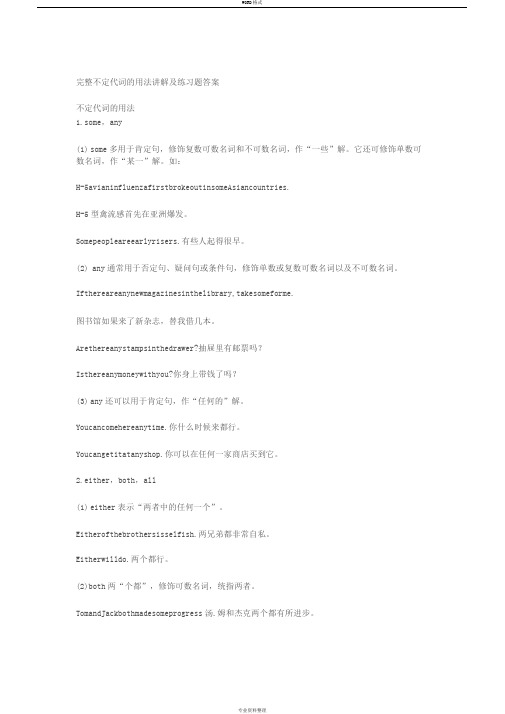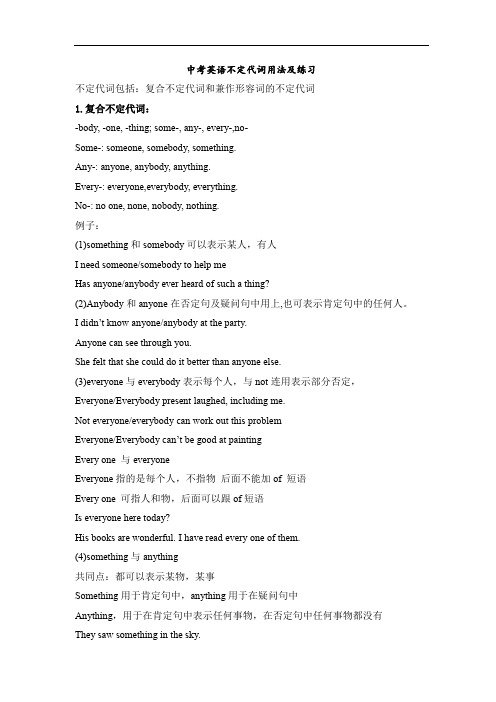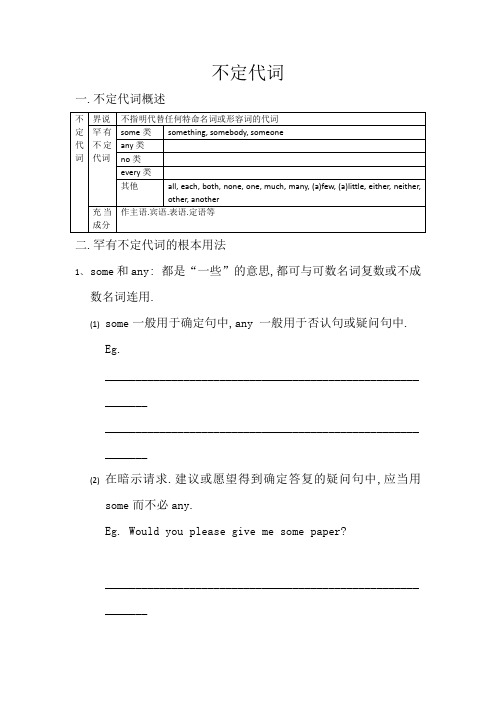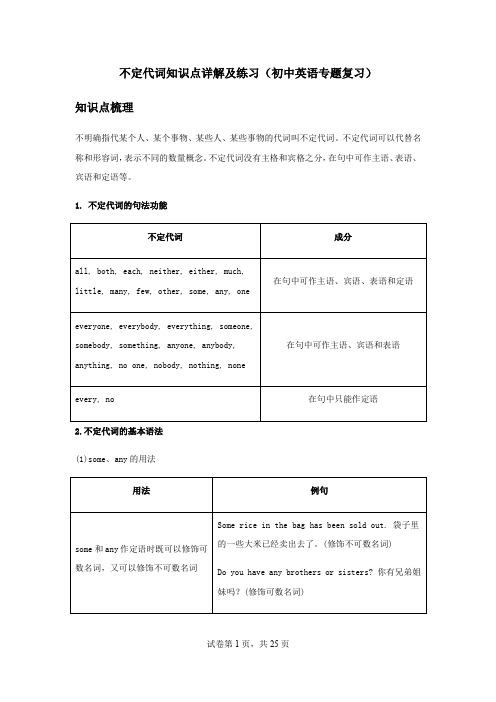初中不定代词讲解及练习
初二不定代词练习题及答案

初二不定代词练习题及答案不定代词是英语语法中的一个重要部分,它们在句子中起到代替名词的作用。
对初二学生来说,学习和掌握不定代词的用法是很重要的。
本文将为大家提供一些不定代词练习题及答案,帮助大家更好地理解和记忆不定代词的用法。
练习题一:填入适当的不定代词,使句子完整和正确。
1. I saw __________ on the street yesterday.2. Would you like __________ to drink?3. __________ of them can speak French.4. __________ is a pen on the desk.5. She has __________ interesting book.答案一:1. someone2. something3. None4. There5. an练习题二:选出括号中适当的不定代词填空。
1. He has __________ income. (little / few)2. Could you lend me __________ money? (some / any)3. There are __________ people in the park. (many / much)4. I have __________ news to tell you. (some / a few)5. There is __________ wrong with my phone. (nothing / anything)答案二:1. little2. some3. many4. some5. nothing练习题三:将括号中的句子改写为含有不定代词的句子。
1. He told me the truth. (He told me __________)2. Sarah isn't going to the party. (__________ isn't going to the party)3. We have some coffee in the kitchen. (We have __________ coffee in the kitchen)4. They saw a dog in the park. (They saw __________ dog in the park)5. She ate an apple for breakfast. (She ate __________ for breakfast)答案三:1. He told me something.2. Someone isn't going to the party.3. We have some coffee in the kitchen.4. They saw a dog in the park.5. She ate something for breakfast.练习题四:选择正确的不定代词填空。
完整不定代词的用法讲解及练习题答案

完整不定代词的用法讲解及练习题答案不定代词的用法1.some,any(1)some多用于肯定句,修饰复数可数名词和不可数名词,作“一些”解。
它还可修饰单数可数名词,作“某一”解。
如:H-5avianinfluenzafirstbrokeoutinsomeAsiancountries.H-5型禽流感首先在亚洲爆发。
Somepeopleareearlyrisers.有些人起得很早。
(2)any通常用于否定句、疑问句或条件句,修饰单数或复数可数名词以及不可数名词。
Ifthereareanynewmagazinesinthelibrary,takesomeforme.图书馆如果来了新杂志,替我借几本。
Arethereanystampsinthedrawer?抽屉里有邮票吗?Isthereanymoneywithyou?你身上带钱了吗?(3)any还可以用于肯定句,作“任何的”解。
Youcancomehereanytime.你什么时候来都行。
Youcangetitatanyshop.你可以在任何一家商店买到它。
2.either,both,all(1)either表示“两者中的任何一个”。
Eitherofthebrothersisselfish.两兄弟都非常自私。
Eitherwilldo.两个都行。
(2)both两“个都”,修饰可数名词,统指两者。
TomandJackbothmadesomeprogress汤.姆和杰克两个都有所进步。
Bothofthemshouldmakeconcessions.他们双方都应做出让步。
(3)all全“部,所有的”,修饰可数名词和不可数名词,指两个以上的人或物。
Allthestudentscontributedtothefund.所有的学生都为基金会捐了款。
Allofthemoneyhasbeenspent.钱都花完了。
Weareallforyou.我们都支持你。
Sayallyouknowandsayitwithoutreserve.知无不言,言无不尽。
中考英语不定代词用法及练习

中考英语不定代词用法及练习不定代词包括:复合不定代词和兼作形容词的不定代词1.复合不定代词:-body, -one, -thing; some-, any-, every-,no-Some-: someone, somebody, something.Any-: anyone, anybody, anything.Every-: everyone,everybody, everything.No-: no one, none, nobody, nothing.例子:(1)something和somebody可以表示某人,有人I need someone/somebody to help meHas anyone/anybody ever heard of such a thing?(2)Anybody和anyone在否定句及疑问句中用上,也可表示肯定句中的任何人。
I didn’t know anyone/anybody at the party.Anyone can see through you.She felt that she could do it better than anyone else.(3)everyone与everybody表示每个人,与not连用表示部分否定,Everyone/Everybody present laughed, including me.Not everyone/everybody can work out this problemEveryone/Everybody can’t be good at paintingEvery one 与everyoneEveryone指的是每个人,不指物后面不能加of 短语Every one 可指人和物,后面可以跟of短语Is everyone here today?His books are wonderful. I have read every one of them.(4)something与anything共同点:都可以表示某物,某事Something用于肯定句中,anything用于在疑问句中Anything,用于在肯定句中表示任何事物,在否定句中任何事物都没有They saw something in the sky.Is there anything special you want to do or see in Bejing?You can buy anything you wantSo I don’t eat anything that’s been cooked in oil.(5)everything 与nothingPeter loves dreaming about everythig.Alice had nothing to do.PS:不定代词后面加形容词:Do you have anything interesting to tell us?I have nothing important to deal with now.(6)nodody 与no oneNobody/ No one knows the secretI have no one/nobody to talk to.PS:Somebody 与nobody作名词表示:是个人物,无名小卒,小人物I was nothing and nobody with everything to prove.He is somedody in the city.all, another, any, both, each, either, few, little, many, much, neither, other, some.2兼作形容词的不定代词;(1)Some 与anySome修饰可数名词复数与不可数名词,表示一些,在肯定句中Any在于否定句,疑问句和条件句之中。
初中英语不定代词讲解及习题

不定代词一.不定代词概述二.罕有不定代词的根本用法1、some和any: 都是“一些”的意思,都可与可数名词复数或不成数名词连用.(1)some一般用于确定句中,any 一般用于否认句或疑问句中.Eg.____________________________________________________ ___________________________________________________________ _______(2)在暗示请求.建议或愿望得到确定答复的疑问句中,应当用some而不必any.Eg. Would you please give me some paper?____________________________________________________ _______(3)当any 暗示“任何”或“无论哪一个”的意义时,可以用于确定句,此时any要重读.Eg. You may come at any time that is convenient to you.___________________________________________________________2、暗示数目的不定代词(1)many______, few_______, a few_______, 用以代替或润饰可数名词.(2)much______, little_______, a little________,用以代替或润饰不成数名词.(3)_______和_______暗示确定意义,_______和_______暗示否认意义.(4)a lot of 和plenty of 等短语既可以润饰可数名词,又可以润饰不成数名词.3.暗示两者和三者的不定代词(1)暗示两者: both, either, neither(2)暗示三者: all, any, none, every(3)暗示确定:both, all(4)暗示否认:none, neither练一练:用以上不定代词填空.我的怙恃都是大夫.__________________________________街道的双方都种了树.There are trees on ______ sides of the street.= There are trees on ______ side of the street.他有两个儿子,都不富有.He has two sons. ______ of them is rich.他有三个儿子,都不富有.He has three sons. ______ of them is rich.三.复合不定代词的用法(1)复合不定代词somebody ,something ,anything,nothing ,everything, everybody等是由some , any ,no ,every, 加上body, thing 组成的,叫做复合不定代词,在句子中当单数应用.(2)somebody, something, someone 一般用于确定句中;anything, anybody,anyone一般用于疑问句和否认句中.(3)假如要在疑问句中暗示请求.建议等确定的意思或者愿望得到确定的答复时,用somebody, someone 或something.(4)润饰复合不定代词的形容词或不定式应放在它们的后面.Eg. He has nothing much to do today.他今天没有若干工作做.Lucy hasn’t anything important to do. 露西没有任何主要时做.四.疑难拓展1.few/a few/little/a little(1)后接名词的不合._______和_______后接可数名词复数,_______和_______后接不成数名词.Eg. There are _______ new words in the text. 课文中有一些新单词.Can you speak _______ English? 你能说一点英语吗?(2)暗示确定意义和否认意义的差别._______和________ 暗示确定,______和_______暗示否认.Eg. I have ________ friends there. I often play with them. There is _______ meat at home. Let’s buy some.2.other/others/the other/another(1)other暗示“另一个”的意思,在句中可作主语.宾语或定语,不自力应用,平日润饰可数名词复数.(2)others可自力应用,无规模限制.(3)other和others前面加定冠词the 时暗示特指,不加the 暗示泛指.The other暗示两个中的另一个,经常应用于句型”one…the other…”,the others 暗示全体其余的人或物.Eg. I have two brothers. ____ is a doctor; ________ is a teacher.He is always ready to help _______.Five of them are in the classroom. What about _______?(4)another(别的一个,又一个),只能代替或润饰单数名词,可用作主语.宾语或定语,不自力应用.前面不加冠词.Eg. Don’t lose heart. Have another try.(5)Another 后可以跟few 或带数字的复数名词.Eg. Just think what our town will be like in another few years.You’d better stay in bed for another two weeks.3、部分否认及完整否认Not与不定代词all, both, every等暗示全体意义的词连用时组成部分否认;若要暗示完整否认,则须要换用none, neither, no 等.练一练:翻译下列句子.4、all, both, each等用作同位语若用作主语同位语,主语可所以名词或代词;若用作宾语等其他成分的同位语,则宾语等成分必须是人称代词,而不克不实时名词.Eg. We all have read it.(all润饰的主语是代词)The village all have been destroyed.(all润饰的主语是名词)They told us all to wait here.(all 润饰的宾语是代词) 5、one 和it 的差别应用(1)it 指代前面的某物.Eg. Where is my pen? I can’t find it.(it 指代前面提到的那支笔)(2)one可以指人,也可以指物.用来代替上文中提到的单数可数名词以及防止反复,其复数情势为ones.Eg. Your pen is so nice. I want to buy one like this.教室练习训练一、单选.1.The two fishermen saw_______ in the sky while they werefishing by a river.A. something strangeB.anything strangeC. strange somethingD. strange anything2. --- Is ____ here? ---No. Bob and Tim have asked for leave.A.anybodyB. somebodyC. everybodyD. nobody3.---Do you want tea or coffee? ---______.I really don't mind4.The old man has two sons .One is a soldier, _______ is a worker.5. There are shops on _____ side of the street.________ of them do not close till 12 at night.A. both; AllB. every; NoneC. either; SomeD. other; Many6. There is not ___ meat in my bowl. There is ____ chicken in it.A. some; anyB. any; someC. any; anyD. some; some7. Could you do___for me, please?A.everythingB. nothingC. somethingD. anything8. Sorry, I can't answer your question. I know____ about the subject.A. a littleB. littleC. fewD. a few9. ---Which would you like, a cup of tea or a glass of milk?----____, thanks. I think I'll just have a glass of water.A. NoneB. NeitherC. BothD. Either10. Tom shook his head and said to us there was _____ in the classroom.A. anybodyB. nobodyC. somebodyD. everybody11. Could I have _____ bottle of apple juice, please?A. anotherB. otherC. some moreD. second12. There are 25 techers in this grade. Eight of them are womenteachers and ______ are men teachers.A. the otherB. the othersC. othersD. other13. They were all tired, but _____of them took a rest.14. ---We have red and yellow T-shirts. Which colour do youlike?--- I’m afraid ____. I think blue will be OK.A. bothB. eitherC. neitherD. none15. ---Can I come this afternoon o tomorrow morning?---_____ is OK. I’m free today and tomorrow.A. EitherB. NeitherC. BothD. None二.按请求完成句子.1. Both Tom and Tim are good at sports.(改为否认句)______ Tom _____ Tim ______ good at sports.2. I can’t speak much English.(同义句转化)I _____ speak_____ English.3. There is something wrong with his eyes.(改为一般疑问句) ______ ______ _______ wrong with his eyes?4. This answer is right. That answer is also right(同义句转化)______ this answer ______ that one are right.5. They haven’t visited the village.She hasn’t visited thevillage either.(连成一句)___________________________________________三.下列句子中各有一处错误,请找出并纠正.1.It is very difficult, and a few people understand it.______________2.Too many work has to be done. ______________3.Why not buy any bread? ______________4.Anyone know how to do it. ______________5.There is not nothing wrong with the radio. ______________家庭功课一、单选.1.The teacher asked the boy many questions, but he only ansewered ______ of them.A.someB. lotsC. eachD. few2. ---I need something for cutting the paper. ---Oh, you want a knife? OK, I’ll get ___ for you.3.Two places of inteerest in Beijing are well known to people from home and abroad. One is the Great Wall, and _____ is the Summer Palace.A. the otherB. anotherC. otherD. others4. ---Would you like _____ to drink? ---Yes. I’d like a cup of coffee.A. something elseB. else somethingC. anything elseD. else anything5. Maybe the disaster can destroy our homes, but ______ can destroy the love in our people.A. somethingB. everythingC. anythingD. nothing二.改错.2. There are many trees on both side of the road. ___________3. He has three sons, but neither of them lives there. ___________4. All of the storybooks is interesting. ___________5. I have important something to tell you. ___________。
不定代词详解和练习

some和any既可以修饰可数名词又可以修饰不可数名词,some常用在肯定句中,而any则常用在否定和疑问句中。
--Do you have any friends at school? 你在学校有些朋友吗?--I have some English books. 我有几本英语书。
1.但在表示建议,反问,请求的疑问句中,或期望得到肯定回答时,多用some而不用any。
如:Would you like some coffee? 你要不要来点咖啡?What about some fruit juice? 来点水果汁如何?2.当any作“任何”的讲时,起强调作用时,它可以用在肯定句中;Any student can answer this question.任何学生都可以回答这个问题。
3.some还可以作“某个”讲,比如some day 某一天不定代词是由some-,any-,no-,every-加上-one,-body,-thing等组成。
包括something, somebody, someone, anything, anybody, anyone, nothing, nobody, no one, everything, everybody, everyone 等。
它们具有名词性质,可以独立使用,也可以用于形容词前。
1、复合不定代词都具有单数的含义,因此通常被看成是单数第三人称。
当它们充当句子的主语时,其后的谓语动词用单数形式。
如:Is everyone here today? 今天,大家都到齐了吗?Nothing is difficult if you put your heart into it. 世上无难事,只怕有心人。
2、含-one和-body等指人的复合代词可有-‟s属格形式。
如:Everybody‟s business is nobody‟s business.大家的事情没人管。
Is this anybody‟s seat? 这儿有人坐吗?3含-one和-body等指人的复合代词后跟else时,-‟s属格应加在else之后。
牛津上海版八年级上册不定代词专项讲解及练习(有答案)

不定代词不定代词用于代换上文中可数名词的all, both, each, either, none, neither ( every)等表示不定概念的词语考点要求1. 考虑表示“两者”还是“两者以上”:选用不定代词时,首先应根据上下文的关联以及句中某个关键词语对不定代词的限制,考虑其说明“两者”还是“两者以上”的人或物。
如说明“两者”,选用both、either、each或neither。
如说明“两者以上”,选用all、(every)、each或none。
e.g.The twin sisters are both good at math.None of the students in our class wants to go there.2. 考虑表示肯定还是否定:选用不定代词时,还应根据句子意义考虑应该使用表肯定的词语还是表否定的词语。
如说明肯定,使用all、both、either、each或(every)。
如说明否定,使用neither或none。
e.g.None of us wants more because we are all full.3. 考虑作限定词使用时同名词的关系:除none以外的不定代词都可用作限定词,其后所带的名词应考虑使用适当的形式。
all可带复数可数名词或不可数名词;both只能带复数可数名词;either、neither、each、every 只能带单数可数名词。
不定代词作限定词使用时,用来表示总量关系,为前位限定词,应放在整个名词词组的最前面,其中all、both可同中位限定词和数词连用,但either、neither、each、every作限定词时,同其余限定词相排斥。
e.g All the students in our class are going to take part in the sports meeting.Every boy in our class is going swimming this afternoon.4. 考虑作主语时主谓一致性关系:不定代词作主语时,应考虑其说明单数还是复数,以便确定谓语动词是否应使用第三人称单数形式(-s形式)以及be动词使用单数还是复数。
初中英语完整不定代词的用法讲解及练习题(含答案)

不定代词的用法1.some,any(1)some多用于肯定句,修饰复数可数名词和不可数名词,作“一些”解。
它还可修饰单数可数名词,作“某一”解。
如:H-5avian influenza first broke out in some Asian countries.H-5型禽流感首先在亚洲爆发。
Some people are early risers.有些人起得很早。
(2)any通常用于否定句、疑问句或条件句,修饰单数或复数可数名词以及不可数名词。
If there are any new magazines in the library,take some for me.图书馆如果来了新杂志,替我借几本。
Are there any stamps in the drawer?抽屉里有邮票吗?Is there any money with you?你身上带钱了吗?(3)any还可以用于肯定句,作“任何的”解。
You can come here any time.你什么时候来都行。
You can get it at any shop.你可以在任何一家商店买到它。
2.either,both,all(1)either表示“两者中的任何一个”。
Either of the brothers is selfish.两兄弟都非常自私。
Either will do.两个都行。
(2)both“两个都”,修饰可数名词,统指两者。
Tom and Jack both made some progress.汤姆和杰克两个都有所进步。
Both of them should make concessions.他们双方都应做出让步。
(3)all“全部,所有的”,修饰可数名词和不可数名词,指两个以上的人或物。
All the students contributed to the fund.所有的学生都为基金会捐了款。
All of the money has been spent.钱都花完了。
不定代词知识点详解及练习(初中英语专题复习)

Not all books are good.(= All books are not good. 不是所有的书都是好书。
知识拓展:all作主语,指代人时,谓语动词使用复数形式,指代事情时,谓语动词一般使用单数;作同位语时,all在句中的位置与both相同。
(5)复合不定代词的用法
由some,any,every,no与one,body,thing一起构成的代词叫复合不定代词,如something,everybody,anyone,nothing等。由one和body构成的复合不定代词可相互换用。
用法
例句
复合不定代词一般用作单数,在句中作主语、宾语或表语
If you have any questions, please ask me. 如果你有问题,可以问我。
Any child needs love. 任何一个孩子都需要爱。
some和any可以用来修饰单数名词,some表示"某一";any表示"任何的"
Any student can answer this question. 任何学生都可以回答这个问题
some多用于肯定句;在表示请求、劝告、邀请、或不希望对方拒绝的疑问句中用some而不用any
Some of the boys are good at swimming. 一些男孩擅长游泳。
Will you give me some water? 请给我一些水好吗?
any多用于疑问句、否定句和条件状语从句中;用于肯定句中,表示"任何"
little不多,没有什么
知识拓展:
- 1、下载文档前请自行甄别文档内容的完整性,平台不提供额外的编辑、内容补充、找答案等附加服务。
- 2、"仅部分预览"的文档,不可在线预览部分如存在完整性等问题,可反馈申请退款(可完整预览的文档不适用该条件!)。
- 3、如文档侵犯您的权益,请联系客服反馈,我们会尽快为您处理(人工客服工作时间:9:00-18:30)。
不指名代替任何特定名词或形容词的代词叫做不定代词。
常见的不定代词有 all, each, both, either, neither, one, none, little, few, many, much, other, another,等,以及由 some, any, mething 等)。
some, any, no, (a) few, (a) little, both, enough, every no 和 every 构成的合成代词(即 somebody, someone, so有些不定代词用于指两者 (如 both, either, neither)有的不定代词用于指三者 (如 all, any, none, every)Both of my parents are doctors. 我的父母都是医生。
All of the students are interested in it. 所有的学生对此都很感兴趣。
There are trees on any side of the square. 广场的每一边都种有树。
He has two sons, neither of whom is rich. 他有两个儿子,都不富有。
He has three sons, none of whom is rich. 他有三个儿子,都不富有。
each 可用于两者、三者或三者以上,而 every 只用于三者或三者以上,因此用于两者时只能用 each ,不能用 every 。
如:不能说 There are trees on every side of the road.复合不定代词包括 something, somebody, someone, anything, anybody, any one, nothing, nobody, no one, everything, everybody, everyone 等。
它们在句中可用作主语、宾语或表语,但不能用作定语。
something, someone 等和 anything, anyone 等的区别与 some 和 any 的区别一样,前者一般用于肯定句,后者一般用于否定句、疑问句或条件句复合不定代词受定语(形容词)修饰时,定语应放在它们后面:There is nothing wrong with the radio. 这收音机没有毛病。
Have you seen anyone [anybody] famous? 你见过名人吗?指人的复合不定代词若用作主语,其谓语动词一般用单数,相应的人称代词和物主代词也用单数 he, him, his (不一定指男性)。
但在非正式文体中常用复数代词 they, the m,their:Everyone knows this, doesn’t he [don’t they]? 人人都知道这一点,不是吗 ?If anybody [anyone] comes, ask him [them] to wait. 要是有人来,让他等着。
指事物的复合不定代词若用作主语,谓语动词只能用单数,相应的人称代词也只能用 it ,而不用 they :Everything is ready, isn’t it?一切都准备好了,是吗 ?Everyone is here.每个人都在。
anyone, everyone 等只能指人,不能指物,且其后一般不接 of 短语。
若是指物或后接 of 短语,可用 any one, every one (分开写):any one of the boys (books) 孩子们(书)当中的任何一个 (本)every one of the students (schools) 每一个学生(一所学校)按英语习惯, any 以及含有 any 的复合不定代词用于否定句时,它只能出现在否定词之后,而不能在否定词之前:误:Any one doesn’t know how to do it.正: No one knows how to do it. 任何人都不知道如何做它。
误: Anybody [Anyone] cannot do it.正: Nobody [No one] can do it. 这事谁也干不了。
误: Anything cannot prevent me from going.正: Nothing can prevent me from going. 什么也不能阻挡我去。
不定代词 all, both, every 等与 not 连用时构成部分否定;若要表示完全否定,则需换用 none, neither, no one 等。
比较:All of the students like the novel. 所有这些学生都喜欢这本小说。
Not all of the students like the novel. 并不是所有这些学生都喜欢这本小说。
All of the students don’t like the novel. 并不是所有这些学生都喜欢这本小说。
None of the students like the novel. 这些学生当中没有一个喜欢这本小说。
若用作主语同位语,主语可以是名词或代词;若用作宾语等其他成分的同位语,则宾语等成分必须是人称代词,而不能是名词:We have all read it. 我们都读过他。
(all 修饰的主语是代词)The villages have all been destroyed. 村庄都被毁了。
(all 修饰的主语是名词)They told us all to wait there. 他叫我们都在那儿等。
(all 修饰的宾语是代词)但不能说: They told the men all to wait there. (all 修饰的宾语是名词不是代词)用 so little 还是 such little 取决于 little 的意思:若表示数量方面的少“” ,则用 so little ;若表示形状体积的“小” ,则用 such little:He has so little time for reading. 他读书的时间少得可怜。
I’ve never seen such little boxes. 我从未见过那样小的盒子。
一般说来, some 用于肯定句中, any 用于否定句和疑问句中。
但是,在表示请求、邀请或征求意见的句子中,通常要用 some 而不用 any:Would you like some cake? 吃点蛋糕吗?Why not buy some bread? 为什么不买些面包呢?Shall I get some chalk for you? 要我帮你拿些粉笔来吗?any 有时也用于肯定句中,此时表示“任何”:Any colour will do. 任何颜色都行。
Come any day you like. 随便哪天来都可以。
两者都表示“许多”,但 many 修饰或代替可数名词(复数) ,与 few(少数)相对;而 much 用来修饰或代替不可数名词 (单数) ,与 little(少量)相对。
Did you see many people there? 你在那儿看见许多人了吗 ?We don’t have much time. 我们没有许多时间。
在肯定句中,一般用 a lot of, lots of, plenty of 等代之。
但在正式文体中有时也用于肯定句中;另外,若用作主语或主语的定语,或其前有 how, too, as, so, a good, a great 等修饰,也可用于肯定句中:Many of us left early. 我们有许多人离开得很早。
Much work has been done. 许多工作都已经做了。
You’ve given me too mu ch. 你已给我太多了。
Take as many (much) as you want. 你要多少拿多少。
I asked her a great many questions. 我问了她许多问题。
few 和a few 后接可数名词的复数形式。
few 表示数量很少或几乎没有,强调“少”,含有否定意义; a few 表示数量虽然少但毕竟还有,强调“有”,含有肯定意义:It is very difficult, and few people understand it. 它很难,没有几个人能懂。
It is very difficult, but a few people understand it. 他虽难,但是有些人懂。
little 和 a little 之后接不可数名词,其区别跟 few 和 a few 之间的区别相似:Unfortunately, I had little money on me. 很不巧,我身上没带什么钱。
Fortunately, I had a little money on me. 幸好我身上带着一点钱。
不定代词是历年来考试中考查最多的一类。
在学习过程中应特别注意以下几组代词的用法:1. some 用于肯定句以及表示建议或期待得到肯定回答的问句。
修饰单数名词时,意为“某个”。
如:I have some questions about the assignment.Would you mind buying me some sweet ?(希望得到肯定答复)。
2. any 用于否定句和疑问句时,表示一“些”。
用于肯定句时,只和单数名词或不可数名词连用,表示“任何”。
如:The medicine is on sale every where. You can get it at any chemist's.1. each 强调个体,表示两个或两个以上中的每“一个”,在句中可充当主语、宾语、定语和同位语。
如:There are trees and flowers at each side of the road.2. every 强调整体,表示三者或三者以上中的“每一个”,只能作定语,不能说 every of them ,要说 every one of them . 如:Every student in our class works hard.1. noone 意为“没有人”,只能指人,不能指物,不可与介词 of 连用,谓语动词用单数形式,回答 who 引导的问句。
如:— Who is in the classroom ?— No one.2. none 既可指人,也可指物,强调数量,意为“一点也不,一个也不”;谓语动词既可用单数也可用复数;常与 of 连用,通常指“三者以上的人或物中没有一个”,回答how much 和 how many 引导的问句。
